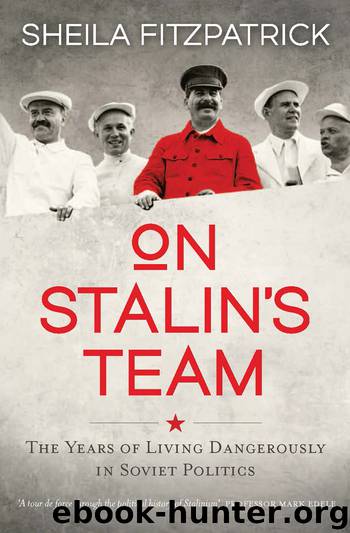On Stalin's Team by Sheila Fitzpatrick

Author:Sheila Fitzpatrick
Language: eng
Format: epub
Publisher: Melbourne University Publishing
Published: 2015-10-15T16:00:00+00:00
EIGHT
AGING LEADER
STALIN WAS A SICK AND AGING MAN AFTER THE WAR, HIS WORK ABILITY diminishing with each passing year. He spent more and more time in the South: an average of almost three months a year from 1945 to 1948, almost five months in 1950, and finally no less than seven months from August 1951 to February 1952. Even when he was in Moscow, his working day contracted sharply. He stopped chairing the Council of Ministers, handing it over to Voznesensky and then to Malenkov. He complained ever more often of age. Even the loyal Molotov noted that his work capacity was diminishing as time went on. Others not in daily contact with him were shocked by the decline between 1945 and 1948. When Ambassador Novikov came back from the United States in the spring of 1947, having not seen Stalin up close since 1941, he discovered “an elderly, very elderly, tired person who was evidently straining to bear the heavy burden of his great responsibilities,” in place of the powerful, energetic figure he had met during the war. Stalin made mistakes that nobody dared correct; he forgot names (Bulganin’s, on one occasion; admittedly, Bulganin was forgettable). He spent more and more time at the dacha and not at his Kremlin office. “You would be lost without me,” Stalin liked to say to the team. Once, they would have agreed; now, probably not. A future without Stalin was becoming imaginable.
Beria, who had always had a sharp tongue despite his deferential face-to- face manner, was increasingly open in his acid remarks about the leader; the others, fearing it was an incitement to subversive comments on their part, reacted warily. Khrushchev, who retained an attachment to Stalin, was beginning to find dealing with him something like dealing with an elderly relative with time on his hands. “He suffered terribly from loneliness,” he remembered, so “he needed people around him all the time. When he woke up in the morning, he would immediately summon us, either inviting us to the movies [at the Kremlin in the evening] or starting some conversation which could have been finished in two minutes but was stretched out so that we would stay with him longer.” It was a waste of time for the team, busy running the government, but going on vacations with him, which he also demanded, was “sheer torture.” “I had to spend all my time with him, sitting over endless meals. Whenever I was offered up in sacrifice, Beria used to cheer me up by saying: ‘Look at it this way: someone has to suffer; it might as well be you.’”1
Stalin’s loneliness was exacerbated by a near-total breakdown of relations with his two surviving children, Svetlana and Vasily, and the arrest of more of his in-laws, including people he had been close to. Svetlana’s marriage to Yury Zhdanov was not going well: Yury was always busy at the office, among other things being instructed by Stalin, with evident relish, on how to apply the faction-fighting skills Stalin had honed in the 1920s to science.
Download
This site does not store any files on its server. We only index and link to content provided by other sites. Please contact the content providers to delete copyright contents if any and email us, we'll remove relevant links or contents immediately.
| Africa | Americas |
| Arctic & Antarctica | Asia |
| Australia & Oceania | Europe |
| Middle East | Russia |
| United States | World |
| Ancient Civilizations | Military |
| Historical Study & Educational Resources |
The Radium Girls by Kate Moore(12018)
100 Deadly Skills by Clint Emerson(4921)
Rise and Kill First by Ronen Bergman(4780)
The Templars by Dan Jones(4683)
The Doomsday Machine by Daniel Ellsberg(4485)
The Rape of Nanking by Iris Chang(4203)
Killing England by Bill O'Reilly(3996)
Stalin by Stephen Kotkin(3957)
Hitler in Los Angeles by Steven J. Ross(3942)
12 Strong by Doug Stanton(3541)
Hitler's Monsters by Eric Kurlander(3329)
Blood and Sand by Alex Von Tunzelmann(3195)
The Code Book by Simon Singh(3181)
Darkest Hour by Anthony McCarten(3119)
The Art of War Visualized by Jessica Hagy(3001)
Hitler's Flying Saucers: A Guide to German Flying Discs of the Second World War by Stevens Henry(2752)
Babylon's Ark by Lawrence Anthony(2673)
The Second World Wars by Victor Davis Hanson(2521)
Tobruk by Peter Fitzsimons(2510)
